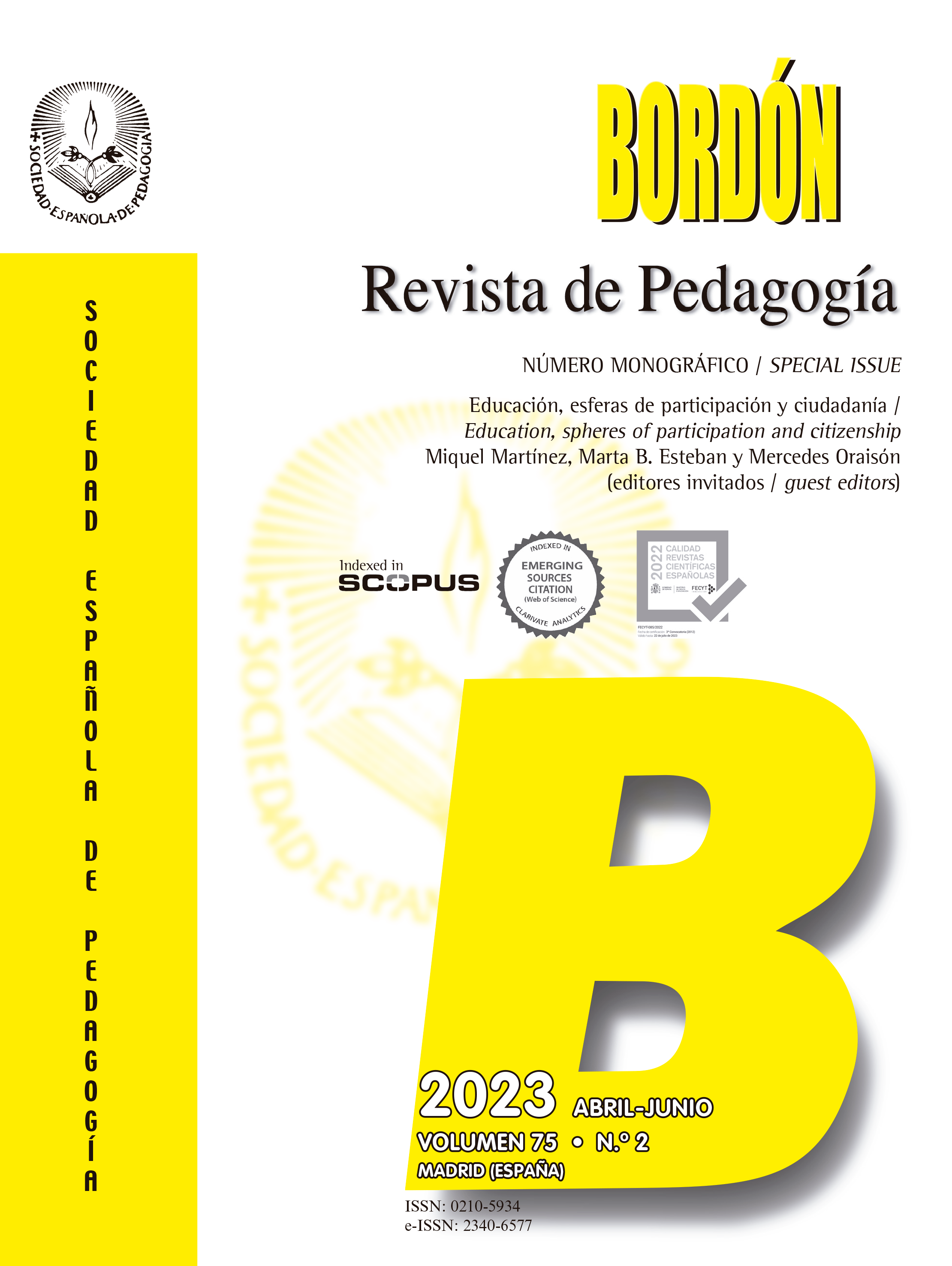Ocio educativo y acción sociocultural, promotores de participación y cohesión social
Contenido principal del artículo
Resumen
INTRODUCCIÓN. Se presenta los resultados de la investigación “Ocio, acción sociocultural y cohesión social”, cuyo objetivo ha sido profundizar en la correlación existente entre las prácticas de ocio y de acción sociocultural dirigidas a los niños/as, adolescentes y jóvenes, y la cohesión social del territorio y la participación como dimensión de esta. Se estudian casos de cuatro barrios de las comunidades autónomas de Cataluña y País Vasco, seleccionados a partir de la elaboración de un mapa de indicadores de cohesión social construido mediante sistemas internacionales validados. MÉTODO. La metodología de investigación ha sido un diseño mixto explicativo secuencial (DEXPLIS) de carácter participativo. A partir de las aportaciones de vecinos, personas significativas de los barrios, profesionales y niños/as, adolescentes y jóvenes, se analizaron sus percepciones sobre la contribución de las entidades y actividades de ocio y acción sociocultural al desarrollo de la participación y cohesión social en los barrios. En concreto, participaron 836 personas en las diferentes fases y técnicas de recogida de datos. RESULTADOS. Los resultados muestran evidencias de las relaciones existentes entre la participación en actividades de ocio educativo y de acción sociocultural y la cohesión social percibida, a nivel de barrio y general, por parte de los participantes. También cómo la participación en dichas actividades de niños y niñas y adolescentes contribuye a la mejora y a la profundización en aspectos claves de la cohesión social, como el apoyo vecinal y la propia participación social. DISCUSIÓN. Concluimos el trabajo discutiendo los resultados y destacando aspectos que este estudio pone de manifiesto, especialmente la necesidad de reconocer la aportación de las entidades e iniciativas de ocio educativo y de acción sociocultural en relación no solo con la socialización y la formación de niños, jóvenes y adultos, sino también con su aportación en la vida comunitaria, la participación y cohesión social de sus territorios.
Descargas
Detalles del artículo

Esta obra está bajo una licencia internacional Creative Commons Atribución-NoComercial 4.0.
Citas
Agenda 2030 sobre el Desarrollo Sostenible (29 de agosto 2020). Recuperado de: https://www.un.org/sustainabledevelopment/es/objetivos-de-desarrollo-sostenible/
Alonso, I. y Artetxe, K. (eds.). (2019). Educación en el tiempo libre: la inclusión en el centro. Octaedro.
Atkinson, R. (2019). Social Cohesion. En A. Orum (ed.), The Wiley-Blackwell Encyclopedia of Urban and Regional Studies. John Wiley & Sons.
Beauvais, C. y Jenson, J. (2002). Social cohesion: Updating the state of the research. CPRN.
Bennett, M. (2014). Intergroup Social Exclusion in Childhood: Forms, Norms, Context, and Social Identity. Journal of Social Issues, 70(1), 183-195.
Breton, R., Dion, K. K. y Dion, K. L. (2009). Multiculturalism and social cohesion: Potentials and challenges of diversity. Springer.
Cano-Hila, A. B., Sabariego, M. y Folgueiras, P. (2019). La participación comunitaria de los jóvenes en contextos urbanos vulnerables: aportaciones desde un diagnóstico colaborativo en el área metropolitana de Barcelona (España). OBETS. Revista de Ciencias Sociales, 14(2), 313-342.
Dayrit, M. y Mendoza, R. (2020). Social Cohesion vs COVID-19. Recuperado de: https://ssrn.com/ abstract=3555152
Durkheim, E. (1982). De la división del trabajo social. Buenos Aires.
Elliott, J., Gale, C., Parsons, S. y Kuh, D. (2014). Neighbourhood cohesion and mental wellbeing among older adults: a mixed methods approach. Social Science & Medicine, 107.
European Committee for Social Cohesion (CDCS) (2008). The High-Level Task Force on Social Cohesion in the 21st century https://wcd.coe.int/ViewDoc.jsp?id=1206295&Site=CM
European Union (2010). EUROPA 2020. Una Estrategia para un crecimiento inteligente, sostenible e integrador. UE-DG.
González, R. y Estévez A. (2017). El apoyo social percibido moderador entre el uso problemático de internet y la sintomatología depresiva en jóvenes adultos. Salud y drogas, 17(1), 53-62.
Ibarretxe, J. (2014). Inversión en inclusión social: retos y alternativas. Lan Harremanak. Revista de Relaciones Laborales, 29, 244-255.
Jackson, A., Fawcett, G., Milan, A., Roberts, P., Schetagne, S., Scott, K. y Tsoukalas, S. (2000). Social cohesion in Canada: possible indicators. Canadian Council on Social Development.
Johnson, R. B. y Onwuegbuzie, A. J. (2004). Mixed methods research: A Research Paradigm Whose Time Has Come. American Educational Research Association, 33, 14-26.
Marcús, J. (2012). Apuntes sobre el concepto de identidad. Intersticios. Revista Sociológica de Pensamiento Crítico, 5(1), 107-114.
Méndez, A. (2013). La participación social y su impacto en los procesos de cohesión social en el barrio La Coma. Educación Social. Revista de Intervención Socioeducativa, 53, 137-150.
Novella, A. M., Llena, A., Noguera, E., Gómez, M., Morata, T., Trilla, J. et al. (2014). Participación infantil y construcción de la ciudadanía. Graó.
Palasí, E. (2019). Lideratge social per a la construcció de comunitats cohesionades des d’entitats de lleure educatiu i d’acció social. Estudi de casos [tesis doctoral]. Universidad Ramon Llull.
Patel, J. A., Nielsen, F. B. H., Badiani, A. A., Assi, S., Unadkat, V. A., Patel, B., Ravindrane, R. y Wardle, H. (2020). Poverty, inequality and COVID-19: the forgotten vulnerable. Public Health, 183, 110-111.
Pradel, M. y García, M. (eds.). (2018). El momento de la ciudadanía: innovación social y gobernanza urbana. Catarata.
Putland, C. (2008). Lost in translation: the question of evidence linking community-based arts and health promotion. Journal of health psychology, 13(2), 265-276.
Save the Children (2020). Covid-19: Cerrar la brecha. Impacto educativo y propuestas de equidad para la desescalada. Save the Children.
Social polis Platform (2017). Social Polis (Social Platform on cities and social cohesion). Final Report Sumary. Newcastle. https://cordis.europa.eu/project/id/217157/reporting
Stenseng, F., Belsky, J., Skalicka, V. y Wichstrøm, L. (2014). Social Exclusion Predicts Impaired Self-Regulation: A 2-Year Longitudinal Panel Study Including the Transition from Preschool to School. Journal of Personality, 83(2), 212-220.
Walsh, K., O’Shea, E., Scharf, T. y Shucksmith, M. (2014). Exploring the Impact of Informal Practices on Social Exclusion and Age-Friendliness for Older People in Rural Communities. Journal of Community & Applied Social Psychology, 24(1), 37-49.

